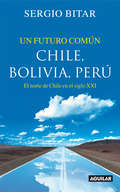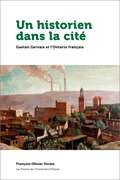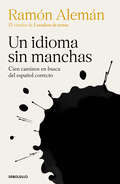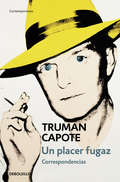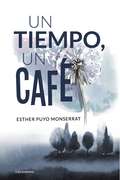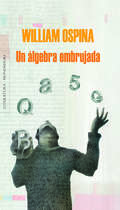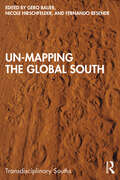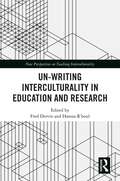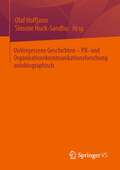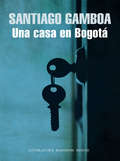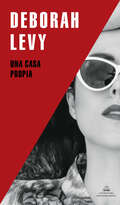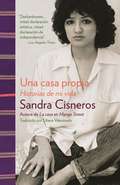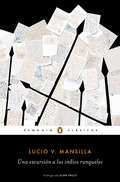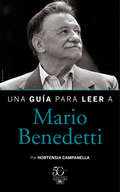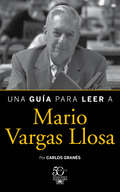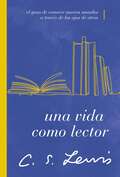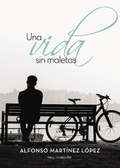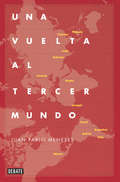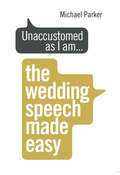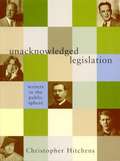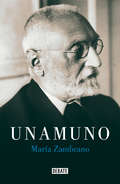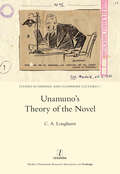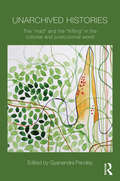- Table View
- List View
Un futuro común. Chile, Bolivia, Perú
by Sergio BitarEl desarrollo futuro de la zona fronteriza del norte de Chile, occidente de Bolivia y sur del Perú depende de los acuerdos políticos, de la integración y de la superación de los resabios de la Guerra del Pacífico, argumenta el ex senador de la zona norte de Chile en este libro de gran valor para las negociaciones bilaterales. En este libro, Sergio Bitar sostiene que el norte de Chile puede ser un área de gran expansión si encontramos fórmulas eficaces para abordar los problemas pendientes y, por ello, propone un nuevo modelo de salida al mar para Bolivia, con sus compensaciones. En la visión del ex senador, el norte chileno ya no es un territorio a proteger, sino que a integrar; las fronteras no pueden seguir concibiéndose como barrera, sino como contacto para beneficio conjunto de Chile, Bolivia y Perú.
Un historien dans la cité: Gaétan Gervais et l’Ontario français (Amérique française)
by François-Olivier DoraisÀ la fois témoin et acteur des grandes transformations socio-identitaires qui ont marqué l’Ontario français depuis la fin des années 1960, Gaétan Gervais est aussi connu à titre de créateur du drapeau franco-ontarien en 1975. Les divers lieux d’enracinement de sa pensée sont étudiés depuis le Sudbury français des années 1940 et 1950, en passant par le contexte de mutations culturelles, politiques et historiographiques des décennies d’après-guerre. L’étude s’étend au contenu des écrits de l’historien ainsi qu’à ses interventions dans les sphères publique et gouvernementale de l’Ontario et de la francophonie canadienne, notamment au regard de l’éducation postsecondaire. L’analyse fait ressortir les paramètres structurants de sa pensée et montre comment celle-ci opère dans l’espace propre au milieu minoritaire francoontarien. Elle fait apparaître l’historien comme l’une des principales figures énonciatrices d’une représentation identitaire axée sur une continuité référentielle avec la mémoire du Canada français historique.
Un idioma sin manchas: Cien caminos en busca del español correcto
by Ramón Alemán100 curiosidades sobre la lengua española que contagian entusiasmo y amor por un idioma que puede ser hermosamente complejo Ramón Alemán, corrector de textos y periodista con décadas de experiencia, nos trae en este libro una guía práctica para mejorar el uso de nuestro idioma a través de anécdotas y ejemplos explicados con rigor, humor y sencillez. En estas páginas, responde a las dudas que nos surgen en el día a día como hispanohablantes y nos trae la sabiduría de los grandes conocedores y expertos del español. Así, los misterios de la gramática y la ortografía se desvelan sin esfuerzo, y antes de que nos demos cuenta han quedado resueltos.
Un placer fugaz: Correspondencia
by Truman CapoteLa correspondencia privada de uno de los grandes escritores del siglo XX. Incisivo, mordaz, seductor, impertinente, cínico y romántico, Truman Capote, el enfant terrible de las letras norteamericanas, no es solo uno de los grandes narradores del siglo XX, sino también un icono cultural, un mito, una leyenda que se agranda con el paso del tiempo. El grueso de las cartas compiladas en este volumen, editado por su biógrafo Gerald Clarke, conforman una suerte de autobiografía en la que el autor de Desayuno en Tiffany's se confiesa ante los distintos corresponsales a lo largo de toda su vida, desde los años de tímido adolescente y genio precoz en Nueva York, pasando por el despertar a la fama con su primera novela, el voluntario y largo exilio europeo, la infernal redacción de A sangre fría, su obra maestra, hasta llegar a la decadencia, física e intelectual, en los años ochenta, víctima de la depresión, el alcohol y las drogas. Por estas páginas desfilan, magistralmente evocados por la lengua viperina de Capote, todos los escritores de su generación, pero también actores, actrices, pintores, fotógrafos, políticos: todo el siglo XX, con sus luces y sus sombras, reverbera a través de esta verdadera novela epistolar.
Un tiempo, un café
by Esther Puyo MonserratLa historia de un café, y la historia de una época. <P><P>Tras la muerte de su abuela, Raquel y sus cinco hermanos pasarán la mayor parte del tiempo en el bar que regenta su madre. Por allí verán desfilar a los últimos cómicos ambulantes, a los primeros políticos en busca de voto, a ocasionales turistas culturales ya un sinfín de personajes que conforman un retrato de la vida social de una parte de nuestra historia reciente. <P> Desde la perspectiva del mundo rural, y a modo de pequeños relatos, la voz de la protagonista va guiando al lector a través de pasajes conmovedores, divertidos o dramáticos, tejiendo la historia de un café, en una época que ya se va perdiendo en la lejanía de la memoria.
Un álgebra embrujada
by William OspinaPersonajes de la talla de Poe, Neruda, Chesterton y Shakespeare sondescritos por la exquisita pluma de William Ospina. De poetas y soñadores, de sortilegios y malabarismos, está hecho estelibro de ensayos. Y en efecto, como un hechicero que va sumandoingredientes a su humeante marmita, William Ospina ha convocado lasartes mágicas de Poe y Chesterton, de Eliot y Neruda; de Alfonso Reyes yEstanislao Zuleta; de José Asunción Silva y Jorge Isaacs; de Quevedo,Shakespeare, Dickens y Borges, para conmovernos hasta lo más hondo yllevarnos a tener la implacable certeza de que la vida sin ellos, sinsus textos, sería menos luminosa, perdería mucha de su gracia.
Un-Mapping the Global South (Transdisciplinary Souths)
by Fernando Resende Gero Bauer Nicole HirschfelderThis book offers new approaches and insights into the ongoing and topical discussions on the concepts and definitions of the global south. Instead of adding to the debates about how to properly define the "global south" as such, it aims at emphasising concrete experiences and accounts of (post-)colonial dislocation and disidentification as both a starting point and linchpin for the subsequent exploration. It brings into conversation theories and interrogations of the "global south" with specific local studies, without presenting them as the romanticised "other" or as "non-western" narratives. As a bold initiation of future conversations on issues that both directly and indirectly affect ideas about the global south, the volume will be of great interest to scholars and researchers of critical theory, literary and cultural studies, and global south studies.
Un-writing Interculturality in Education and Research (New Perspectives on Teaching Interculturality)
by Fred Dervin Hamza R’boulThis highly original and stimulating edited volume focuses on ways of un‑writing the polysemous, controversial and highly political notion of interculturality in research and education.The authors argue that no ‘critical’ perspective on interculturality can do without revising, exploring and creating ways of engaging with different and potentially new aspects and forms of inquiry of the notion in writing. They also claim that un‑writing interculturality can serve an emancipatory function towards an epistemic re‑appraisal of the mainstream(s) and the dominant(s). While critiquing problematic perspectives, as well as the ‘taken‑for‑granted’ and ‘things as usual’ within interculturality scholarship, writing about interculturality is epistemically significant and indicative of change in the ways the notion is used. Each chapter reflects on how to un‑write, un‑do and un‑learn interculturality in research and aims to provide some answers to the following questions: What could un‑writing interculturality mean? What are the pros and cons of un‑writing in research on intercultural communication education? and How does constant work on languaging around interculturality contribute to enriching the notion globally?The book is aimed at students and scholars who wish to push the boundaries of scholarly engagement with interculturality, especially in relation to their modalities of writing, reasoning and critiquing.
UnVergessene Geschichten – PR- und Organisationskommunikationsforschung autobiographisch
by Olaf Hoffjann Simone Huck-SandhuDie deutschsprachige PR- und Organisationsforschung gehört heute zu jenen kommunikationswissenschaftlichen Forschungsfeldern, die sich längst etabliert und zu einer festen Größe in den meisten kommunikationswissenschaftlichen Instituten geworden sind. Eine solche Etablierung, Professionalisierung und Institutionalisierung ist wesentlich auch von Personen getragen – und von Gründerpersönlichkeiten, die ein Feld mit ihren Arbeiten geprägt haben. Die erste Generation der PR- und Organisationskommunikationsforscherinnen und -forscher im deutschsprachigen Raum ist entweder bereits emeritiert oder steht kurz davor. Sie steht im Mittelpunkt dieses Bandes: Wie sind sie selbst zur PR- und Organisationskommunikationsforschung gekommen? Welche Weichenstellungen, Menschen oder auch glückliche Zufälle leiteten ihren Weg? Was hat ihre eigene Arbeit wesentlich geprägt? Wie bewerten sie die Phasen ihres fachlichen Wirkens rückblickend? Der Band beleuchtet die Entstehung und Entwicklung der deutschsprachigen PR- und Organisationskommunikationsforschung aus autobiographischen Perspektiven: essayistisch, persönlich und höchst lesenswert.
Una casa en Bogotá
by Santiago GamboaGracias al Premio Internacional Rubén BonifazNuño, en la categoría de ensayo, el filólogo nar radorde estas pág inas puede comprar su casa. Después detoda una vida de desearla, de obser varla, de acercar sea sus paredes de piedra y ladrillo rojo para descifrar elenigma de su atracción, logra por fin saberla suya, yen el momento en el que franquea el umbral comosu dueño, reconoce en ella su destino, su lugar en elmundo, el espacio a la medida de sus gustos y de suconcepción de la vida.La instalación en esta vieja casona bogotana es unproceso paciente y, más que físico, reflexivo y memorístico.Pues cada r incón, la madera de los pisos, losbaños, el comedor, la vajilla, la biblioteca, las habitaciones,la mansarda, incluso el bar rio entrevisto por lasventanas, dan pie a un viaje fascinante por la vida delprotagonista. Conocemos de su existencia itineranteen compañía de su tía, sus preocupaciones intelectuales,su amor por los libros y la lengua, sus ricas experiencias sexuales, su descubrimiento del lado oscurode las ciudades, así como las estelas de una remotatragedia que lo persigue desde la niñez.
Una casa propia
by Deborah LevyEl cierre de la Autobiografía en construcción de una Deborah Levy que logra su habitación propia. Deborah Levy imagina una casa en una latitud cálida, cerca de un lago o de un mar. Allí hay una chimenea y un mayordomo que atiende sus deseos, hasta el de discutir. Pero Levy en realidad está en Londres, no tiene dinero para construir el hogar que imagina, su apartamento es minúsculo y lo más parecido a un jardín en su casa es un banano al que entrega los cuidados que sus hijas ya no necesitan. La menor ha abandonado el nido, y Levy, a sus cincuenta y nueve años, está lista para afrontar una nueva etapa en su vida. Así, nos lleva desde Nueva York a Bombay, pasando por París y Berlín, mientras teje una estimulante y audaz reflexión sobre el significado del hogar y de los espectros que lo acechan. Entretejiendo el pasado y el presente, lo personal y lo político, y convocando a Marguerite Duras, Elena Ferrante, Georgia O’Keeffe o Céline Schiamma, la autora indaga en el significado de la feminidad y de la propiedad. A través de sus recuerdos hace inventario de sus posesiones reales e imaginarias y cuestiona nuestra forma de entender el valor de la vida intelectual y cotidiana de la mujer. Después de Cosas que no quiero saber y El coste de vivir, esta obra es la culminación de una autobiografía escrita en el fragor de una vida que no está solamente protagonizada por Levy, sino por todas las mujeres que la sostienen con una red invisible. Reseñas: «La voz imprevisible, tierna, incisiva, entristecida y entusiasta de la Levy biógrafa ofrece un festín literario.»Gonzalo Torné, El Cultural «Por supuesto, Levy es feminista, su autobiografía desvela no solo una postura como mujer, también esa visión impregna otros temas como la migración, el imperialismo, el racismo o el amor. Estos textos según Levy tenían que narrar dos aspectos que nunca coexisten: el poder de los hombres y la vulnerabilidad que se permite la mujer al escribir.» Ariana Basciani, The Objective Sobre Cosas que no quiero saber: «Una narración vivaz y brillante sobre cómo los detalles más inocentes de la vida personal de una escritora pueden alcanzar el poder en la ficción.»The New York Times Book Review «Un relato vívido y sorprendente de la vida de la escritora, que feminiza y personaliza las contundentes a afirmaciones de Orwell.»The Spectator Sobre El coste de vivir: «Derrocha en el segundo tomo de su autobiografía tanto hallazgos expresivos como verdades acendradas [...] en un tapiz algo descosido que sin embargo se lee con delectación y donde rubrica sobre todo el regreso a los planteamientos de Simone de Beauvoir en El segundo sexo; esto es, vuelve a admitir la dificultad desquiciante de conjugar pareja, maternidad e independencia intelectual.»El Periódico «El coste de vivir es el precio que debe pagar una mujer para desmontar un hogar en el que ya no se siente como en casa. Para Levy, este acto radical da inicio a la búsqueda de una nueva vida que resulta inseparable de la búsqueda de una nueva narrativa.»The Times
Una casa propia: Historias de mi vida
by Sandra CisnerosWinner of the PEN Center USA Literary Award for Creative NonfictionFrom Chicago to Mexico, the places Sandra Cisneros has lived have provided inspiration for her now-classic works of fiction and poetry. But a house of her own, a place where she could truly take root, has eluded her. In this jigsaw autobiography, made up of essays and images spanning three decades—and including never-before-published work—Cisneros has come home at last. Written with her trademark lyricism, in these signature pieces the acclaimed author of The House on Mango Street shares her transformative memories and reveals her artistic and intellectual influences. Poignant, honest, and deeply moving, A House of My Own is an exuberant celebration of a life lived to the fullest, from one of our most beloved writers.
Una excursión a los indios ranqueles
by Lucio V. MansillaEdición definitiva del clásico de Lucio V. Mansilla, con prólogo de Alan Pauls y nota preliminar a cargo de Alejandra Laera. «Si me hubieran dicho que los indios me iban a enseñar a conocer la humanidad, una carcajada homérica habría sido mi contestación. Como Gulliver, en su viaje a Liliput, yo he visto al mundo tal cual es en mi viaje a los ranqueles.» Originariamente publicadas como folletín, en 1870, en el diario La Tribuna, las cartas que componen este libro son el particular relato de la expedición de Lucio V. Mansilla Tierra Adentro y de su encuentro con los indios ranqueles. Con una minuciosidad por momentos cercana a la obsesión, en ellas el autor toma nota de los detalles de la geografía pampeana y describe lúcidamente los hábitos, costumbres y comportamientos del mundo indígena, ese gran Otro de la literatura argentina. Una excursión a los indios ranqueles no solo es la historia del contacto entre dos culturas, sino un clásico que, escrito con anterioridad a la constitución del Estado, supo advertir en la nación todas sus fatales contradicciones. «Pero pronto el desierto empieza a poblarse, primero con los ranqueles, luego con lo que Mansilla hace con ellos, ve en ellos, piensa y escribe sobre ellos [...] forzado a menudo a constatar, no sin perplejidad, las diversas lecciones de civilización que los ranqueles tienen para dar a los cristianos».Alan Pauls
Una guía para leer a Mario Benedetti
by Hortensia CampanellaUna guía para leer a Mario BenedettiUna aproximación a la inmensa producción literaria del autor uruguayo, marcada por la coherencia y el compromiso.El aprecio por sus libros y el cariño, casi veneración, que suscitó en los más diversos rincones del idioma hacen de Mario Benedetti un personaje que va mucho más allá del escritor. En esta guía, además de adentrarte en su obra, podrás leer las primeras páginas de algunos de sus libros.Con motivo de su 50 aniversario, Alfaguara pone a disposición de los lectores una colección de guías de lectura gratuitas en edición digital de los autores más emblemáticos de su catálogo, como una oportunidad de descubrir las claves de sus obras.
Una guía para leer a Mario Vargas Llosa
by Carlos GranésUna guía para leer a Mario Vargas LlosaUn gigante de la literatura universal y uno de los mejores escritores latinoamericanos de todos los tiempos. Por qué leer a Mario Vargas Llosa, por dónde empezar a leerlo, cómo clasificar el tipo de novelas que escribe, cuáles son los temas recurrentes de sus historias... son algunas de las preguntas que podrás responder con esta guía, además de leer las primeras páginas de sus novelas.Con motivo de su 50 aniversario, Alfaguara pone a disposición de los lectores una colección de guías de lectura gratuitas en edición digital de los autores más emblemáticos de su catálogo, como una oportunidad de descubrir las claves de sus obras.
Una rosa en invierno
by Kathleen WoodiwissUna versión completa y con una nueva traducción de la gran obra de Kathleen Woodiwiss, que sigue siendo, 25 años después de su publicación, una de las preferidas de todas las lectoras. Una maravillosa historia de pasión, amor y honor en torno al dilema amoroso de la indómita Erienne. Acuciada por su padre, que quiere casarla a cambio de una cuantiosa dote, esta joven enamorada tendrá que escoger entre el deber y el dictado de su corazón.
Una vida como lector: El gozo de conocer nuevos mundos a través de los ojos de otros
by C. S. LewisEl venerado profesor y autor de bestsellers reflexiona sobre el poder, la importancia y la alegría de una vida dedicada a la lectura en esta magnífica colección extraída de su amplia obra.Muchas décadas después de su muerte, el venerado intelectual y profesor C. S. Lewis sigue hablando a los lectores, gracias no solo a sus conocimientos intelectuales sobre el cristianismo, sino también a sus maravillosas obras creativas y sus profundas reflexiones sobre la literatura que influyó en su vida. Amado por sus instructivas novelas, como Las cartas del diablo a su sobrino, El gran divorcio y Las crónicas de Narnia, así como por sus libros filosóficos que exploran la teología y la vida cristiana, Lewis fue escritor y amante de los libros durante toda su vida.Elaborada a partir de sus numerosos ensayos, artículos y cartas, así como de sus obras clásicas, Una vida como lector brinda orientación y reflexiones relacionadas con el amor a los libros y su disfrute. Esta amplia colección incluye las reflexiones de Lewis sobre la ciencia ficción, por qué la literatura infantil es para lectores de todas las edades y por qué deberíamos leer dos libros viejos por cada uno nuevo. Esta recopilación, una ventana al pensamiento de uno de los mayores intelectuales de nuestro tiempo, revela no solo por qué Lewis amaba la palabra escrita, sino también lo que significa aprender de la literatura con una de nuestras más sabias y perennes maestras.The Reading LifeThe revered teacher and bestselling author reflects on the power, importance, and joy of a life dedicated to reading books in this delightful collection drawn from his wide body of writings.More decades after his death, revered intellectual and teacher C. S. Lewis continues to speak to readers, thanks not only to his intellectual insights on Christianity but also his wondrous creative works and deep reflections on the literature that influenced his life. Beloved for his instructive novels including The Screwtape Letters, The Great Divorce, and The Chronicles of Narnia as well as his philosophical books that explored theology and Christian life, Lewis was a life-long writer and book lover.Cultivated from his many essays, articles, and letters, as well as his classic works, The Reading Life provides guidance and reflections on the love and enjoyment of books. Engaging and enlightening, this well-rounded collection includes Lewis' reflections on science fiction, why children's literature is for readers of all ages, and why we should read two old books for every new one. A window into the thoughts of one of the greatest public intellectuals of our time, this collection reveals not only why Lewis loved the written word, but what it means to learn through literature from one of our wisest and most enduring teachers.
Una vida sin maletas
by Alfonso Martínez López"Normalmente se entiende, por una vida sin maletas, el no llevar colgado de la espalda recuerdos o hechos del pasado. <P><P>En mi caso, una vida sin maletas, se refiere, a no tener adonde mandarte el correo." "Creo que he resultado ser esclavo y víctima de mi trabajo y lo mismo de mi vida. No sé si es una apreciación acertada. Posiblementelo averigüe cuando termine de escribir este libro. Hay quien dice que todo se basa en los sentimientos. Y posiblemente, tenga razón. Pero yo creo que todo es circunstancial, siendo algo que se tiene o no se tiene, en función de lo que a cada uno le toca vivir.
Una vuelta al tercer mundo: La ruta salvaje de la globalización
by Juan Pablo MenesesUna vuelta al tercer mundo es un deslumbrante, doloroso, profundo y divertido recorrido por ese lado salvaje que nunca vende la gran industria del turismo. ¿Por qué hay países que nunca están incluidos en las vueltas al mundo?¿Qué hay en las zonas más sombrías de la aldea global?¿Cómo es la trastienda del consumo multinacional? Juan Pablo Meneses, que antes atravesó América Latina buscando comprar un niño futbolista para vender a Europa, ahora arma una ruta alrededor del planeta con las sobras que va dejando el progreso primermundista. En un apasionante viaje por esa grieta que divide al planeta, recorre la ciudad de Dakar después de que le quitaron el rally; consume chatarra cibernética en Kuala Lumpur; sigue el rastro de un jerarca nazi prófugo en una zona perdida de Brasil; cuenta muertos en la frontera entre Pakistán y la India; acompaña en su luchaa las cholitas voladoras de Bolivia; come en los restaurantes más caros de Etiopía, y se embarca en un buque-escuela de la armada de Ucrania que no tiene presupuesto para cruzar el temido cabo de Hornos. En Ho Chi Minh City dispara un fusil AK-47 en el campo de batalla de la guerra de Vietnam; compra souvenirs del subcomandante Marcos en Chiapas; visita la mina San José, en el desierto de Atacama, con uno de los treinta y tres mineros chilenos que quedaron atrapados bajo tierra, y está en el Vaticano cuando por primera vez un hombre del tercer mundo, el argentino Jorge Mario Bergoglio, se transforma en Papa. Juan Pablo Meneses utiliza su reconocido talento de cronista para relatarnos su viaje personal en busca de algo que no encuentra: el pensamiento global tercermundista.
Unaccustomed as I am...: The Wedding Speech Made Easy
by Michael ParkerAll wedding types will be catered for: big, small, religious, second marriage, atheist, straight, same-sex, church, field... All speakers will be addressed: bride, groom, father, mother, best woman and literally everyone in between... All eventualities will be planned for: mic failures, drunk guests, missing brides, smashed glasses, weeping FOBs, forgotten words... All of which will be delightfully and wittily illustrated, with a mix of little-known wedding facts and a whole host of inspirational (or not) quotations.
Unacknowledged Legislation: Writers in the Public Sphere
by Christopher HitchensA celebration of Percy Shelley's assertion that 'poets are the unacknowledged legislators of the world', these 35 essays on writers from Oscar Wilde to Salman Rushdie, dispel the myth of politics as a stone tied to the neck of literature.
Unamuno
by María ZambranoUna esclarecedora reflexión acerca de la obra de Miguel de Unamuno y de los aspectos filosóficos que ocuparon su pensamiento, de una de las más grandes pensadoras españolas de nuestro tiempo. Este libro recoge un largo y esclarecedor ensayo inédito de la escritora María Zambrano sobre la figura y la obra de don Miguel de Unamuno, escrito hacia 1940 en el exilio cubano de la autora y que, por diversas circunstancias, había permanecido extraviado hasta fechas muy recientes. Recoge también, bajo la atenta y cuidadosa edición de Mercedes Gómez Blesa, otros artículos de Zambrano acerca de determinados aspectos de la obra del autor de San Manuel Bueno, mártir que tan solo habían visto la luz en distintas revistas latinoamericanas. Escrito desde la más profunda admiración y empatía intelectual y estética, María Zambrano analiza, comenta e indaga en los pliegues más significativos del pensamiento unamuniano, haciendo aflorar sus vetas más relevantes. Ubica en primer lugar al autor dentro de las coordenadas históricas, culturales y filosóficas de su tiempo para detenerse después en algunas de las claves de su obra: las relaciones entre filosofía y religión, entre conocimiento y poesía, entre tragedia y existencia, o en las raíces de su original y singular entendimiento de «el ser de España» dentro de su obra. Reseña:«Más que un libro es un "inquietante diálogo entre Zambrano y Unamuno".»María José Díaz de Tuesta, El País
Unamuno
by María ZambranoUna esclarecedora reflexión acerca de la obra de Miguel de Unamuno y de los aspectos filosóficos que ocuparon su pensamiento, de una de las más grandes pensadoras españolas de nuestro tiempo. Este libro recoge un largo y esclarecedor ensayo inédito de la escritora María Zambrano sobre la figura y la obra de don Miguel de Unamuno, escrito hacia 1940 en el exilio cubano de la autora y que, por diversas circunstancias, había permanecido extraviado hasta fechas muy recientes. Recoge también, bajo la atenta y cuidadosa edición de Mercedes Gómez Blesa, otros artículos de Zambrano acerca de determinados aspectos de la obra del autor de San Manuel Bueno, mártir que tan solo habían visto la luz en distintas revistas latinoamericanas. Escrito desde la más profunda admiración y empatía intelectual y estética, María Zambrano analiza, comenta e indaga en los pliegues más significativos del pensamiento unamuniano, haciendo aflorar sus vetas más relevantes. Ubica en primer lugar al autor dentro de las coordenadas históricas, culturales y filosóficas de su tiempo para detenerse después en algunas de las claves de su obra: las relaciones entre filosofía y religión, entre conocimiento y poesía, entre tragedia y existencia, o en las raíces de su original y singular entendimiento de «el ser de España» dentro de su obra. Reseña:«Más que un libro es un "inquietante diálogo entre Zambrano y Unamuno".»María José Díaz de Tuesta, El País
Unamuno's Theory of the Novel
by C.A. LonghurstMiguel de Unamuno (1864-1936) is widely regarded as Spain's greatest and most controversial writer of the first half of the twentieth century. Professor of Greek, and later Rector, at the University of Salamanca, and a figure with a noted public profile in his day, he wrote a large number of philosophical, political and philological essays, as well as poems, plays and short stories, but it is his highly idiosyncratic novels, for which he coined the word nivola, that have attracted the greatest critical attention. Niebla (Mist, 1914) has become one of the most studied works of Spanish literature, such is the enduring fascination which it has provoked. In this study, C. A. Longhurst, a distinguished Unamuno scholar, sets out to show that behind Unamuno's fictional experiments there lies a coherent and quasi-philosophical concept of the novelesque genre and indeed of writing itself. Ideas about freedom, identity, finality, mutuality and community are closely intertwined with ideas on writing and reading and give rise to a new and highly personal way of conceiving fiction.
Unarchived Histories: The "mad" and the "trifling" in the colonial and postcolonial world (Intersections: Colonial and Postcolonial Histories)
by Gyanendra PandeyFor some time now, scholars have recognized the archive less as a neutral repository of documents of the past, and rather more as a politically interested representation of it, and recognized that the very act of archiving is accompanied by a process of un-archiving. Michel Foucault pointed to "madness" as describing one limit of reason, history and the archive. This book draws attention to another boundary, marked not by exile, but by the ordinary and everyday, yet trivialized or "trifling." It is the status of being exiled within – by prejudices, procedures, activities and interactions so fundamental as to not even be noticed – that marks the unarchived histories investigated in this volume. Bringing together contributions covering South Asia, North and South America, and North Africa, this innovative analysis presents novel interpretations of unfamiliar sources and insightful reconsiderations of well-known materials that lie at the centre of many current debates on history and the archive.
